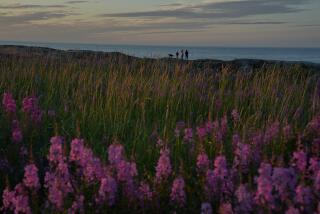Canadian Colonial Firm Relies on Its Trading Post Traditions for Growth
- Share via
TORONTO — A small Canadian company present at the birth of the nation has been brought back to life and is flourishing by looking to its roots, including fur-trading.
Although North West Co. Inc. was founded in 1779, it spent most of the past 200 years as a division of its onetime rival, Hudson’s Bay Co.
But in 1987, a group of employees and investors bought the division, repatriated the North West Co. name, and started to take the reborn company forward by looking backward.
Included in the sale was Canada’s first fur-trading post at Waskaganish, on the shores of James Bay in Quebec. The trading post had been founded in 1668 by Hudson’s Bay.
“They’ve done extremely well by focusing on their traditional markets,” said Marie-Josee Privyk, an analyst with Marleau Lemire Securities Inc.
Based in Winnipeg, Manitoba, North West now owns and operates 153 stores in Canada, 26 in Alaska and eight fur marketing branches--stores that buy and sell furs from trappers.
They stretch across Alaska, the Northwest Territories, the northern prairie provinces and Quebec into Labrador and Newfoundland.
“We think of ourselves as a northern retailer,” said Gary Eggerston, North West’s chief financial officer.
When North West was founded, its business plan involved setting up a trading post 200 miles inland to intercept trappers on their way to an outpost of archrival Hudson’s Bay Co., Eggerston said.
“So when North West put in a store, the Bay put in another one, and they leapfrogged each other farther and farther into the Canadian West,” he said.
*
Many Canadian communities grew up around these outposts. The intense rivalry continued for 40 years until 1821, when the two enemies--claiming equal numbers of trading posts--called a truce and formed a partnership.
North West continued happily as Hudson’s Bay’s fur division until 1987, when Hudson’s Bay decided to sell its fur auction houses and its northern stores division.
In 1992, North West decided to sell some of its more “southern” stores to focus on its smaller, more remote outlets. It now owns all of Hudson’s Bay’s ancient trading posts, including Waskaganish.
“Our earnings have continued to increase,” Eggerston said.
Earnings should improve as the benefits from recent renovations to older stores filter through the company and offset the costs of an expansion into Alaska, Privyk said.
Eggerston said the unusual nature of North West’s business leads to an odd combination of goods in its stores. Guns, snowmobiles, wedding dresses and video rentals are available in outlets averaging about 6,000 square feet in size.
“We sell musical instruments, rifles for hunting, things required for people who live off the land,” Eggerston said.
Often the only store in town, North West also cashes checks and occasionally sells fast food through franchises.
North West also acts as North America’s largest distributor of Inuit--or Eskimo--art, buying carvings from local artists and distributing them to galleries around the world from an office in Toronto.
While the company’s earnings have improved since it sold the southern stores, its share price outlook is less rosy. “The whole merchandising sector is out of favor now,” Privyk said. “If 1996 figures are strong, that might turn the stock.”
North West’s share price is languishing at $11.875 in Canadian currency ($8.79 U.S.) after trading as high as $20 Canadian ($14.80 U.S.) on the Toronto Stock Exchange last summer.
More to Read
Sign up for Essential California
The most important California stories and recommendations in your inbox every morning.
You may occasionally receive promotional content from the Los Angeles Times.











